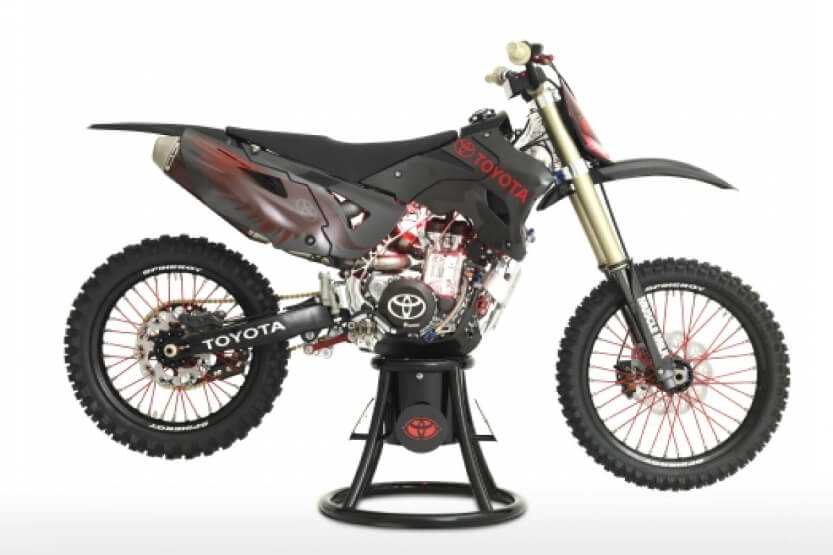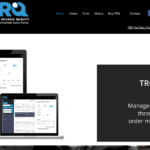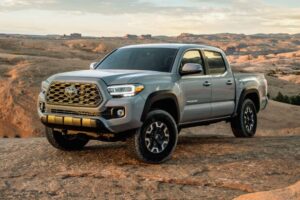Toyota is a renowned Japanese automaker, but did you know that the company also has a history of producing motorcycles?
In fact, Toyota’s involvement in the motorcycle industry dates back to the immediate post-World War II era. During this time, Toyota Motor Corporation established a subsidiary called Toyoda Automatic Loom Works, which produced a range of products including sewing machines and automobiles.
In 1949, Toyoda Automatic Loom Works began producing motorcycles under the name “Toyoda Model G1”.
Despite the company’s best efforts, Toyoda Model G1 motorcycles faced quality control issues, and production ceased in 1955. However, Toyota’s brief foray into the motorcycle industry did not end there.
In 2009, the company collaborated with Joe Gibbs Racing to create a one-off custom motocross bike with a Toyota logo on every surface.
The bike was showcased at the SEMA show and garnered much attention from motorcycle enthusiasts. Despite this project, Toyota has yet to re-enter the motorcycle market on a large scale.
While Toyota may not be a major player in the motorcycle industry, the company’s brief history in the field is an interesting footnote in the company’s overall history. It also serves as a reminder of the challenges faced by any company attempting to enter a new market.
Toyota Motorcycle Models

Toyota is known for its high-quality cars, but did you know that the company also has a history of producing motorcycles? While Toyota has not produced any motorcycles for several decades, the company did have a brief foray into the motorcycle market in the 1960s and 1970s.
Current Lineup
Currently, Toyota does not produce any motorcycles for the consumer market. However, the company has been known to produce one-off concept motorcycles for events like the SEMA show.
These concept motorcycles are often designed to showcase Toyota’s engineering and design capabilities, and are not intended for production.
Concept Motorcycles
One notable concept motorcycle produced by Toyota was the i-Road, an electric three-wheeled vehicle that was first introduced in 2013. The i-Road features a unique leaning system that allows it to corner like a motorcycle, but with the stability of a car.
While the i-Road has not been produced for the consumer market, it has been used in various pilot programs in Japan and France.
Electric and Hybrid Models
While Toyota does not produce any motorcycles, the company has been a leader in the development of electric and hybrid vehicles. In fact, Toyota is the largest producer of hybrid vehicles in the world, with popular models like the Prius and Camry Hybrid.
The company has also produced several electric vehicles, including the RAV4 EV and the Mirai fuel cell vehicle.
In conclusion, while Toyota does not currently produce any motorcycles, the company has a history of producing high-quality vehicles and has been a leader in the development of electric and hybrid vehicles.
While Toyota has produced concept motorcycles in the past, these vehicles are not intended for production and are designed to showcase the company’s engineering and design capabilities.
Design and Engineering
Toyota has always been known for its innovative and quality engineering in the automotive industry. The same can be said for their motorcycle designs. Toyota’s approach to motorcycle design is focused on creating efficient transport with a strong emphasis on quality control and manufacturing.
Innovations in Motorcycle Engineering
Toyota has been at the forefront of combustion engine technology for decades, and this expertise has been applied to their motorcycle designs.
One of Toyota’s innovations in motorcycle engineering is their use of advanced fuel injection systems, which provide increased fuel efficiency and lower emissions. This technology is incorporated into their motorcycle engines to provide a more efficient and environmentally friendly ride.
Quality Control and Manufacturing
Toyota’s approach to quality control and manufacturing is well-known in the automotive industry, and this same approach is applied to their motorcycle production.
Toyota uses a rigorous quality control process to ensure that each motorcycle is built to the highest standards. This includes extensive testing of each component and system to ensure that they meet Toyota’s strict quality standards.
Toyota’s Approach to Motorcycle Design
Toyota’s approach to motorcycle design is focused on creating efficient and reliable transportation. Toyota’s motorcycles are designed to be practical and functional, with an emphasis on rider comfort and safety.
Toyota’s designers work closely with their engineers to ensure that each motorcycle is designed to be aerodynamic and efficient, while also being easy to ride and maintain.
In conclusion, Toyota’s approach to motorcycle design and engineering is focused on creating efficient and reliable transportation with an emphasis on quality control and manufacturing.
Toyota’s innovative approach to motorcycle engineering has resulted in advanced fuel injection systems that provide increased fuel efficiency and lower emissions. Toyota’s rigorous quality control process ensures that each motorcycle is built to the highest standards.
Market and Industry Position

Competitive Analysis
The global motorcycle market is highly competitive, with numerous players vying for market share. The “Big Four” Japanese motorcycle manufacturers, Yamaha, Honda, Suzuki, and Kawasaki, have traditionally dominated the market.
However, in recent years, other players such as Harley-Davidson and Roland Sands Design have also gained significant market share. Toyota’s subsidiary, Toyo Motors, is a relatively new entrant into the motorcycle market.
Toyota’s Motorcycle Market Strategy
Toyo Motors has adopted a unique market strategy to differentiate itself from its competitors. The company has focused on developing high-performance motorcycles that cater to the needs of motorcycle enthusiasts.
Toyo Motors’ motorcycles are known for their reliability, durability, and cutting-edge technology. The company has also invested heavily in research and development to stay ahead of the competition.
Collaborations and Partnerships
Toyo Motors has entered into several collaborations and partnerships to expand its market reach. The company has partnered with several dealerships in Japan and Europe to distribute its motorcycles.
Toyo Motors has also collaborated with Yamaha to develop a new line of motorcycles that cater to the needs of young riders. The company is also exploring partnerships with other players in the motorcycle industry to expand its product portfolio and market reach.
In summary, Toyo Motors’ entry into the motorcycle market has disrupted the traditional dominance of the “Big Four” Japanese motorcycle manufacturers. The company’s focus on high-performance motorcycles and cutting-edge technology has helped it gain a foothold in the market.
Toyo Motors’ collaborations and partnerships with other players in the industry have also helped it expand its market reach. However, the company still faces stiff competition from established players such as Yamaha, Honda, Suzuki, and Kawasaki.
Consumer Experience
When it comes to owning a Toyota motorcycle, the consumer experience is a top priority for the company. Toyota has a reputation for providing reliable and high-quality products, and their motorcycles are no exception.
Owner Reviews and Testimonials
One of the best ways to gauge the consumer experience of a Toyota motorcycle is through owner reviews and testimonials.
Many owners have praised the motorcycles for their durability, comfort, and performance. Toyota motorcycles have received high ratings in terms of reliability and owner satisfaction, according to Consumer Reports.
After-Sales Services and Support
Toyota also places great importance on after-sales services and support. The company offers a wide range of services to ensure that their customers are satisfied with their purchase.
These services include maintenance and repair services, as well as customer support through their website and hotline. Toyota also provides a comprehensive warranty program for their motorcycles, giving customers peace of mind knowing that their investment is protected.
Dealership and Showroom Experience
The dealership and showroom experience is also an important aspect of the consumer experience. Toyota dealerships are known for their knowledgeable and friendly staff, who are always ready to assist customers with their needs.
The showrooms are designed to showcase the motorcycles in a way that is both informative and engaging. Potential customers can take a closer look at the motorcycles and even take them for a test drive to see how they perform on the road.
In conclusion, Toyota provides a top-notch consumer experience for their motorcycle customers. From the quality and reliability of their products to the after-sales services and support, Toyota is committed to ensuring that their customers are satisfied with their purchase.
Whether you are in the market for a new motorcycle or looking for a reliable mode of transportation, Toyota has got you covered.
Cultural and Societal Impact

Motorcycles are an important part of Japanese culture and society. They are seen as a symbol of freedom, individuality, and adventure. Motorcycles have been a part of Japanese culture since the early 20th century and have played an important role in shaping the country’s identity.
Motorcycles in Japanese Culture
Motorcycles have been a part of Japanese culture for over a century. They have been used for transportation, recreation, and even as a status symbol.
The Honda Super Cub, for example, is one of the most popular motorcycles in Japan and has been in production since 1958. It is often used as a delivery vehicle and is seen as a symbol of reliability and practicality.
In addition to the Super Cub, other motorcycles, such as the Vespa, have also had an impact on Japanese culture. The Vespa was introduced to Japan in the 1950s and quickly became popular among young people. It was seen as a symbol of rebellion and individuality.
Global Influence of Toyota Motorcycles
Toyota motorcycles have had a significant impact on the global motorcycle industry. The company’s commitment to quality and innovation has led to the development of some of the most popular motorcycles in the world.
Toyota’s motorcycles have also had an impact on other industries, such as the bicycle industry. The company’s focus on lightweight materials and aerodynamics has led to the development of some of the most advanced bicycles in the world.
Sustainability and Environmental Considerations
In recent years, there has been a growing concern about the environmental impact of motorcycles. Toyota has been at the forefront of developing sustainable and eco-friendly motorcycles.
The company’s commitment to sustainability is reflected in its production of hybrid and electric motorcycles.
Toyota’s focus on sustainability is not limited to its motorcycles. The company is also committed to reducing the environmental impact of its other products, such as cars and trucks.
Toyota’s commitment to sustainability has made it one of the most environmentally friendly companies in the world.
In conclusion, Toyota motorcycles have had a significant impact on Japanese culture and society. They have also had a global influence on the motorcycle industry and other related industries.
Toyota’s commitment to sustainability and environmental considerations has made it one of the most environmentally friendly companies in the world.
Final Thoughts
In conclusion, while Toyota is known for its cars, trucks, and SUVs, it is not known for producing motorcycles. However, Toyota did produce motorcycles in the past, such as the Toyopet Crown motorcycle in the 1950s.
Today, Toyota’s focus is on producing high-quality automobiles, including electric and hybrid vehicles. Despite the lack of motorcycles in Toyota’s current lineup, the company’s commitment to innovation and technology is evident in their vehicles.
Overall, Toyota’s history with motorcycles is an interesting footnote in the company’s long and successful history. While it is unlikely that Toyota will produce motorcycles again in the near future, their legacy in the motorcycle industry lives on.








![Read more about the article Toyota Truck Models – Tacoma and Tundra [12 Types]](https://roadsumo.com/wp-content/uploads/2020/09/toyota-pickup-truck-models-1-300x200.jpg)
![Read more about the article Toyota Camper Specs, Review, and History [Tacoma, Sienna, and more]](https://roadsumo.com/wp-content/uploads/2021/03/Toyota-camper-300x200.jpg)